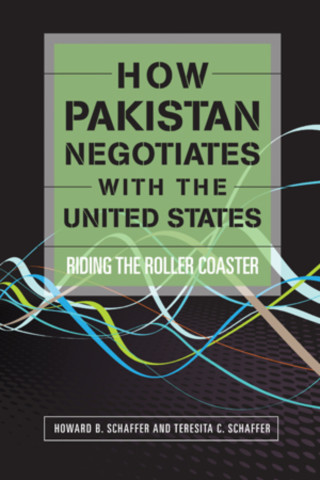How Pakistan Negotiates with the United States
How Pakistan Negotiates with the United States analyzes the themes, techniques, and styles that have characterized Pakistani negotiations with American civilian and military officials since Pakistan’s independence.
How Pakistan Negotiates with the United States is an impressive, insightful and truly important book, especially for Americans who cannot decide whether Pakistan is America’s friend or foe. They will learn that the issue is more complex and respective grievances are more reciprocal.Zbigniew Brzezinski, Counselor and Trustee, Center for Strategic and International Studies
A fascinating account of how Pakistanis have historically used a mix of charm, military polish, occasional deception, guilt trips, pleas of national weakness, knowledge of Afghanistan, and strategically advantageous geography right next to Afghanistan to induce the United States to do more for them.
- Foreign Policy
Read the full review here.
A fascinating account of how Pakistanis have historically used a mix of charm, military polish, occasional deception, guilt trips, pleas of national weakness, knowledge of Afghanistan, and strategically advantageous geography right next to Afghanistan to induce the United States to do more for them. Read the full review here.
- Foreign Policy
Teresita C. Schaffer
Teresita C. Schaffer, Senior Advisor at McLarty Associates, advises clients on matters in India and South Asia. In a 30-year career in the US Foreign Service, Ambassador Schaffer was recognized as one of the State Department’s leading experts on South Asia, where she spent a total of 11 years. Her other career focus was on international economic issues. She served in US embassies in Pakistan, India, and Bangladesh, and from 1992-95 as US Ambassador in Sri Lanka. During her assignments in the State Department in Washington, she was Director of the Office of International Trade and later Deputy Assistant Secretary of state for the Near East and South Asia, at that time the Senior South Asia Policy position in the State Department.
Ambassador Schaffer was previously a Nonresident Senior Fellow at the Brookings Institution. She also created the South Asia program at the Center for Strategic and International Studies, and directed it from 1998-2010. That program produced path-breaking research on economic, political, security and risk management trends on India and Pakistan, but also more broadly on the region that extends from Afghanistan through Bangladesh.
Ambassador Schaffer is the author of India at the Global High Table: The Quest for Regional Primacy and Strategic Autonomy, published in 2016 (co-authored with her husband, Howard Schaffer); as well as India and the US in the 21st Century: Reinventing Partnership, published in 2009 and widely recognized as the leading work on the post-2000 US-India relationship and its future prospects. Ambassador Schaffer and her husband also wrote How Pakistan Negotiates with the United States, published in 2011. Earlier writings included Pakistan’s Future and US Policy Options (2004); India at the Crossroads: Confronting the Challenge of HIV/AIDS (2004) and a series of other studies on HIV and public health issues in India; and two studies on women in development in Bangladesh (1985).
Ambassador Schaffer received a BA from Bryn Mawr College and studied at the Institut d’Etudes Politiques in Paris. She did graduate work in economics at Georgetown University. She speaks Hindi, Urdu, French, Swedish, German and Italian, and has studied Bangla and Sinhala.
Howard B. Schaffer
Howard B. Schaffer was a retired American Foreign Service officer who spent much of his 36-year career dealing with U.S. relations with South Asia. He served as ambassador to Bangladesh (1984-87), political counselor at American embassies in India (1977-79) and Pakistan (1974-77), and was twice deputy assistant secretary of state responsible for South Asian affairs. His earlier assignments included stints as director of the Office of Indian, Nepalese, and Sri Lankan Affairs and postings to New Delhi, Seoul, and Kuala Lumpur. He retired from the Foreign Service in 1991 and returned in 1995 to Washington from Sri Lanka, where his wife, Teresita C. Schaffer, was American ambassador. He joined ISD soon afterwards as Deputy Director and Director of Studies. In 2009 he was given the position of Senior Counselor of the Institute.
Ambassador Schaffer’s most recent book, How Pakistan Negotiates with the United States: Riding the Roller Coaster, co-authored with his wife, Teresita Schaffer, was published by the United States Institute of Peace in 2011. He is also the author of two biographies of American diplomats: Chester Bowles: New Dealer in the Cold War, published by the Harvard University Press in 1993, and Ellsworth Bunker: Global Troubleshooter, Vietnam Hawk, published by the University of North Carolina Press in 2003. His most recent book, The Limits of Influence: America’s Role in Kashmir, published in 2009 by the Brookings Institution Press, won the American Academy of Diplomacy’s prestigious Douglas Dillon Prize for the best volume on the practice of diplomacy written that year by an American author. A South Asian edition of the book has been published by Penguin India. Schaffer has written many articles and book chapters about South Asian issues.
Schaffer had a BA from Harvard College and had done graduate work at Columbia and Princeton. He was an Associate and Diplomat-in-Residence at the Institute in 1987-88 and taught Georgetown undergraduate courses in U.S. South Asian policy and in the practice of diplomacy abroad. He also lead ISD’s weekly key global issues seminar.

